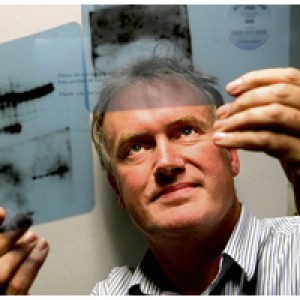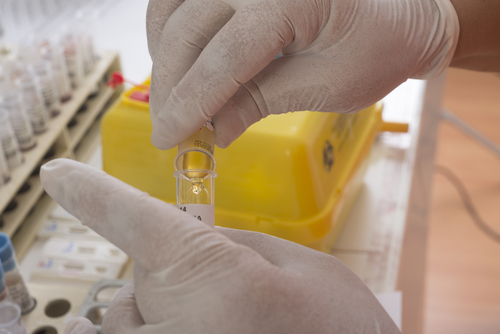An international team of researchers based out of Trinity College Dublin in Ireland and the University of Queensland in Australia have discovered what is being dubbed a “marvel molecule” that blocks a key biological driver underlying a range of inflammatory diseases. The scientists say this breakthrough could address a major unmet clinical need by facilitating development of new non-invasive treatments for difficult-to-treat disorders involving inflammation, such as arthritis, multiple sclerosis, Muckle-Wells syndrome, and an array of other inflammatory illnesses.
In a study published this week in the prestigious preclinical medical journal Nature Medicine, the international Aussie/Irish/German/American research team explain how this molecule, known as MCC950, works to suppress the NLRP3 inflammasome, an immune system activator in the body that senses danger signals via evolutionary conserved receptors — a process key in the development of inflammatory diseases.
The MCC950 molecule is described as “a potent and specific inhibitor of the NLRP3 inflammasome and a novel potential therapeutic for NLRP3 driven diseases” by coauthors of a paper recently published in the journal Cytokine (Volume 70, Issue 1, November 2014, Pages 35), variously representing the University of Queensland Institute for Molecular Bioscience at Brisbane, Australia; the Trinity Biomedical Sciences Institute at Trinity College Dublin, Ireland; the U.S. National Institutes of Health’s Inflammatory Disease Section, Medical Genetics Branch of the National Human Genome Research Institute, at Bethesda, Maryland, USA; the University of Michigan Medical School Department of Pathology and Comprehensive Cancer Center at Ann Arbor; the Institute of Innate Immunity at the University of Bonn at Bonn, Germany; and the Walter and Eliza Hall Institute of Medical Research at Melbourne, Australia — corresponding author Rebecca C. Coll.
Dr. Coll is also lead author of a paper published this month in the journal Nature Medicine, entitled “A small-molecule inhibitor of the NLRP3 inflammasome for the treatment of inflammatory diseases“ (Nature Medicine (2015) doi:10.1038/nm.3806) with Avril A. B. Robertson, Jae Jin Chae, Sarah C. Higgins, Ral Muoz-Planillo, Marco C. Inserra, Irina Vetter, Lara S. Dungan, Brian G. Monks, Andrea Stutz, Daniel E. Croker, Mark S. Butler, Moritz Haneklaus, Caroline E. Sutton, Gabriel Nez, Eicke Latz, Daniel L. Kastner, Kingston H. G. Mills, Seth L. Masters, Kate Schroder, Matthew A. Cooper, and Luke A. J. O’Neill.
The coauthors note that inflammasomes have been recognized as potentially promising therapeutic targets by researchers for more than a decade now, and that discovery of MCC950’s effects represents a “hugely significant development” in the quest to develop new, more effective treatments for inflammatory diseases to augment and replace current therapies that are either unsatisfactorily ineffective or have other major shortcomings and limitations.
They add that a crucial aspect of their findings also confirms that inflammatory disorders share a common process, even though different parts of the body come may become inflamed.
 Dr. Luke O’Neill, a professor and Chair of Biochemistry at Trinity College, and the joint senior scientist behind the MCC950 discovery, observes in a release that: “Drugs like aspirin or steroids can work in several diseases, but can have side effects or be ineffective. What we have found is a potentially transformative medicine, which targets what appears to be the common disease-causing process in a myriad of inflammatory diseases.”
Dr. Luke O’Neill, a professor and Chair of Biochemistry at Trinity College, and the joint senior scientist behind the MCC950 discovery, observes in a release that: “Drugs like aspirin or steroids can work in several diseases, but can have side effects or be ineffective. What we have found is a potentially transformative medicine, which targets what appears to be the common disease-causing process in a myriad of inflammatory diseases.”
Research at Dr. O’Neill’s lab at Trinity is focused on the molecular basis to inflammatory diseases, with a particular interest in pro-inflammatory cytokines and toll-like receptors.
Nature Medicine paper lead author Rebecca Coll, PhD is a post-doctoral fellow in Dr. O’Neill’s lab, and who conducted some of the research work at Trinity, comments: “MCC950 is blocking what was suspected to be a key process in inflammation. There is huge interest in NLRP3 both among medical researchers and pharmaceutical companies and we feel our work makes a significant contribution to the efforts to find new medicines to limit it.”
 Co-senior author Dr. Matt Cooper, a chemistry professor at the University of Queensland’s Institute for Molecular Bioscience (IMB), points out that “MCC950 is able to be given orally and will be cheaper to produce than current protein-based treatments, which are given daily, weekly, or monthly by injection. Importantly, it will also have a shorter duration in the body, allowing clinicians to stop the anti-inflammatory action of the drug if the patient ever needed to switch their immune response back to 100% in order to clear an infection.
Co-senior author Dr. Matt Cooper, a chemistry professor at the University of Queensland’s Institute for Molecular Bioscience (IMB), points out that “MCC950 is able to be given orally and will be cheaper to produce than current protein-based treatments, which are given daily, weekly, or monthly by injection. Importantly, it will also have a shorter duration in the body, allowing clinicians to stop the anti-inflammatory action of the drug if the patient ever needed to switch their immune response back to 100% in order to clear an infection.
Research at Dr. Cooper’s Lab is focused on discovering new ways to detect and treat bacterial infections, inflammatory disease and cancer. The Cooper Group’s research is leading to new ways to diagnose infections caused by bacteria and viruses, and a deeper understanding of the molecular mechanisms that lead to the evolution and spread of drug resistance, and in partnership with more than 12 other laboratories worldwide, they are designing and developing new molecules to target the interface between infection and our immune systems response that leads to acute and chronic inflammatory disease.
The scientists report that thus far, results of their efforts are showing great promise for blocking multiple sclerosis in a model of that disease, as well as in sepsis, where fatal blood poisoning potentially occurs in response to bacterial infection. They also note that the target for MCC950 is strongly implicated in diseases such as Alzheimer’s disease, atherosclerosis, gout, Parkinson’s disease and rheumatoid arthritis, which indicates that the molecule offers potential for treating all of these conditions and more.
For instance, they observe that a new MCC950-derived drug might significantly benefit patients afflicted with Muckle-Wells syndrome — a mercifully rare bit severe auto-inflammatory disorder. Using blood samples from Muckle-Wells patients, the paper’s authors show that MCC950 can block the rogue gene responsible for repeated inflammatory activation in Muckle-Wells sufferers.
 Dr. Dan Kastner Chief of the Laboratory of Clinical Investigation in the National Institute of Arthritis and Musculoskeletal and Skin Diseases (NIAMS), Clinical Director of NIAMS, and Deputy Director for Intramural Clinical Research at the the U.S. National Institutes of Health, notes in the Trinity College release that MCC950 might well be a key addition to the options for treating Muckle-Wells syndrome and similar diseases.
Dr. Dan Kastner Chief of the Laboratory of Clinical Investigation in the National Institute of Arthritis and Musculoskeletal and Skin Diseases (NIAMS), Clinical Director of NIAMS, and Deputy Director for Intramural Clinical Research at the the U.S. National Institutes of Health, notes in the Trinity College release that MCC950 might well be a key addition to the options for treating Muckle-Wells syndrome and similar diseases.
Dr. Dan Kastner’s laboratory has a long-standing interest in human genetic disorders of inflammation. He led an international consortium that identified the gene causing familial Mediterranean fever in 1997, and his group subsequently discovered that mutations in the p55 tumor necrosis factor receptor cause a dominantly inherited periodic fever syndrome that they named TRAPS (the TNF receptor-associated periodic syndrome).
Based on these findings, Dr. Kastner proposes application of the term “autoinflammatory” in describing the constellation of diseased conditions characterized by seemingly unprovoked episodes of inflammation, without the presence of high titer autoantibodies or antigen-specific T-cells, which are now known to be disorders of the innate immune system.
Professor O’Neill summarizes: “We are really excited about MCC950. We believe this has real potential to benefit patients suffering from several highly debilitating diseases, where there is currently a dire need for new medicines.”
The study reported in the Nature Medicine paper involved a major collaboration effort among six institutions worldwide: Trinity and the Universities of Queensland, Michigan, Massachusetts and Bonn. Work in the O’Neill laboratory is supported by Science Foundation Ireland and the European Research Council.
The research paper can be viewed here: http://www.nature.com/nm/journal/vaop/ncurrent/full/nm.3806.html


